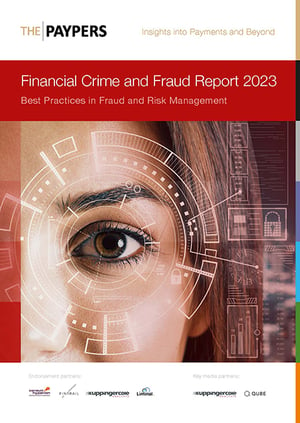Sandy Lavorel reveals how netguardians has developed a way for banks to share information on fraud risk that significantly improves detection rates for fraud and identifies accounts used for money laundering.
In a breakthrough in the fight against financial crime, the Swiss fintech has developed a way for banks to share information on fraud risk that not only significantly improves detection rates for fraud but also identifies accounts used for money laundering.
Banks, regulators, policy-makers, and law enforcement have to date treated fraud and money laundering as two very different, unrelated, difficult-to-prevent crimes. Even the teams within banks and other organisations dealing with fraud and money laundering are often siloed. This is a mistake that criminals easily exploit, as evidenced by the record amounts being lost to fraudsters and laundered worldwide through the banking system.
The scale of failure
The FBI received reports of online scams causing losses exceeding USD 10 billion in 2022, marking the greatest annual loss over the past five years. Further, according to the United Nations Office on Drugs and Crime, about 3.6% of global GDP (approximately USD 1.6 trillion) is laundered every year.
Failure on this scale cannot continue, which is why we’re calling for banks, regulators, and policy-makers to adopt a new approach. One that acknowledges and takes advantage of the very close links between the two crimes, draws on community intelligence and promotes collaboration and cooperation.
Any money the fraudsters steal must be washed through money-mule bank accounts. If we can identify and confirm a fraudulent transaction, we can identify the destination — or the mule accounts. Using this knowledge allows us to catch the fraudsters and stop the laundering. But it’s easier said than done.
Diverse challenges
The challenges of doing so thus far have been manifold. There’s the ever-evolving nature of the fraud scams and methods that make them harder to spot, while the ease and speed at which criminals can open digital bank accounts through which to wash their cash makes them hard to track. There are also data protection and privacy regulations that prevent banks from easily sharing information linked to suspicious accounts, often stopping one bank from warning others.
Unless we do something fast, things are only getting worse.
The current cost of living crisis and harsh economic climate are pushing more people toward crime, ensuring a steady supply of money mules and individuals willing to front scams. This trend is being facilitated and fuelled by dark web sales of software-as-a-service for fraud scams, which means people can commit fraud without having to be computer experts.
Together, these worrying trends make it clear that more effective prevention and detection are a priority. Indeed, banks themselves have already started to call for more cooperation in these areas.
Compliant data-sharing is key
At a recent international anti-money laundering and fraud conference in London, for example, representatives from banks including ING, Commerzbank, and Lloyds all agreed they need to cooperate more and share data to stop the criminals. But, mindful of the challenges, are unsure where to turn.
Numerous techniques can be employed to ensure data retains its core intelligence value whilst simultaneously respecting security, confidentiality, and liability concerns. This anonymised data could be shared to protect customers and prevent financial crime.
At NetGuardians, that is exactly what we do.
For more than a decade, we’ve been successfully helping banks worldwide to stop fraud. By drawing on this success, and our understanding that where there’s a fraud attempt there’s also a money mule, we’ve developed a service that is proving powerful in the fight against both.
Our Community Scoring & Intelligence Service (CS&I) pools anonymised transaction data from participating banks to gain more insights. It aggregates the data we receive, cleans it, standardises, and formats it so that the resulting intelligence is easy to understand and can be used immediately by member banks to enhance their analytics and help them more accurately assess the fraud risk of every transaction.
In addition, the service also focuses on the receiving account to spot money mules.
Whenever we spot fraud, we know that the receiving bank account will be the start of a money-mule journey. The anonymised data that banks share with us enables us to identify the receiving mule account. We share this intelligence compliantly with other banks, including the receiving bank, to alert them.
Community effort
The more banks that participate in the community, the more information there is about both fraudulent activity and money-mule accounts. We believe that by adding in further intelligence from carefully chosen third parties such as law enforcement agencies, we will be able to prevent far more fraud and identify and stop money mules. As more banks join, we create a virtuous circle.
Banks already using our software see the opportunity to tackle fraud and money laundering simultaneously. They are reaping the benefits and are eager for others to join. As the head of risk at one private bank client says: ‘We can stop money mules if we co-operate. It’s time to share data across institutions to prevent these crimes and, where we can’t prevent them, to recover the assets.’
Our service could not come at a better time. The current chilly economic climate will only push more people toward illegal activities, including becoming mules for money launderers and perpetuating frauds themselves. Working together, we can stop the upward trends and even reverse them. Working together, we can all become financial crime fighters.
This editorial was initially published in the Financial Crime and Fraud Report 2023 which dives into the captivating world of fraud management, digital onboarding, and financial crime in the financial services industry. You can download your free copy here.
About Sandy Lavorel
 |
Sandy Lavorel, a NetGuardians financial crime fighter, is a Certified Fraud Examiner and an expert in Anti-Money Laundering. He has several years of consulting experience and is a fervent advocate of the collaborative approach to fighting financial crime. |
This article first appeared on The Paypers website, on Monday 3 July 2023
Editor: Raluca Ochiana
Take this article with you:




